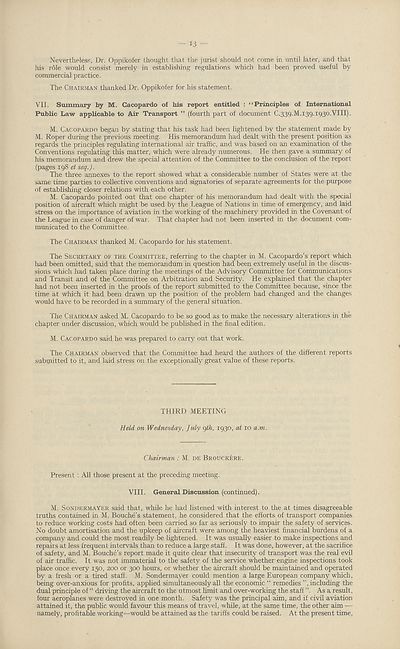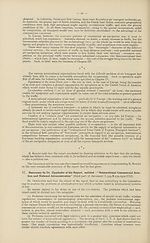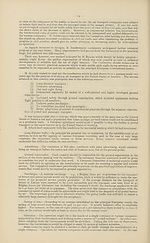Communications and transit > Air transport co-operation committee : minutes of the first session : held at Geneva from July 8th to 12th, 1930
(13)
Download files
Complete book:
Individual page:
Thumbnail gallery: Grid view | List view

Nevertheless, Dr. Oppikofer thought that the jurist should not come in until later, and that
his role would consist merely in establishing regulations which had been proved useful by
commercial practice.
The Chairman thanked Dr. Oppikofer for his statement.
VII. Summary by M. Cacopardo of his report entitled : "Principles of International
Public Law applicable to Air Transport ” (fourth part of document C.339.M.139.1930.VIII).
M. Cacopardo began by stating that his task had been lightened by the statement made by
M. Roper during the previous meeting. His memorandum had dealt with the present position as
regards the principles regulating international air traffic, and was based on an examination of the
Conventions regulating this matter, which were already numerous. He then gave a summary of
his memorandum and drew the special attention of the Committee to the conclusion of the report
(pages 198 et seq.).
The three annexes to the report showed what a considerable number of States were at the
same time parties to collective conventions and signatories of separate agreements for the purpose
of establishing closer relations with each other.
M. Cacopardo pointed out that one chapter of his memorandum had dealt with the special
position of aircraft which might be used by the League of Nations in time of emergency, and laid
stress on the importance of aviation in the working of the machinery provided in the Covenant of
the League in case of danger of war. That chapter had not been inserted in the document com¬
municated to the Committee.
The Chairman thanked M. Cacopardo for his statement.
The Secretary of the Committee, referring to the chapter in M. Cacopardo’s report which
had been omitted, said that the memorandum in question had been extremely useful in the discus¬
sions which had taken place during the meetings of the Advisory Committee for Communications
and Transit and of the Committee on Arbitration and Security. He explained that the chapter
had not been inserted in the proofs of the report submitted to the Committee because, since the
time at which it had been drawn up the position of the problem had changed and the changes
would have to be recorded in a summary of the general situation.
The Chairman asked M. Cacopardo to be so good as to make the necessary alterations in the
chapter under discussion, which would be published in the final edition.
M. Cacopardo said he was prepared to carry out that work.
The Chairman observed that the Committee had heard the authors of the different reports
submitted to it, and laid stress on the exceptionally great value of these reports.
THIRD MEETING
Held on Wednesday, July gth, 1930, at 10 a.m.
Chairman : M. de Brouckere.
Present : All those present at the preceding meeting.
VIII. General Discussion (continued).
M. Sondermayer said that, while he had listened with interest to the at times disagreeable
truths contained in M. Bouche’s statement, he considered that the efforts of transport companies
to reduce working costs had often been canned so far as seriously to impair the safety of services.
No doubt amortisation and the upkeep of aircraft were among the heaviest financial burdens of a
company and could the most readily be lightened. It was usually easier to make inspections and
repairs at less frequent intervals than to reduce a large staff. It was done, however, at the sacrifice
of safety, and M. Bouche’s report made it quite clear that insecurity of transport was the real evil
of air traffic. It was not immaterial to the safety of the service whether engine inspections took
place once every 150, 200 or 300 hours, or whether the aircraft should be maintained and operated
by a fresh or a tired staff. M. Sondermayer could mention a large European company which,
being over-anxious for profits, applied simultaneously all the economic “ remedies ”, including the
dual principle of “ driving the aircraft to the utmost limit and over-working the staff ”. As a result,
four aeroplanes were destroyed in one month. Safety was the principal aim, and if civil aviation
attained it, the public would favour this means of travel, while, at the same time, the other aim ■—
namely, profitable working—would be attained as the tariffs could be raised. At the present time,
his role would consist merely in establishing regulations which had been proved useful by
commercial practice.
The Chairman thanked Dr. Oppikofer for his statement.
VII. Summary by M. Cacopardo of his report entitled : "Principles of International
Public Law applicable to Air Transport ” (fourth part of document C.339.M.139.1930.VIII).
M. Cacopardo began by stating that his task had been lightened by the statement made by
M. Roper during the previous meeting. His memorandum had dealt with the present position as
regards the principles regulating international air traffic, and was based on an examination of the
Conventions regulating this matter, which were already numerous. He then gave a summary of
his memorandum and drew the special attention of the Committee to the conclusion of the report
(pages 198 et seq.).
The three annexes to the report showed what a considerable number of States were at the
same time parties to collective conventions and signatories of separate agreements for the purpose
of establishing closer relations with each other.
M. Cacopardo pointed out that one chapter of his memorandum had dealt with the special
position of aircraft which might be used by the League of Nations in time of emergency, and laid
stress on the importance of aviation in the working of the machinery provided in the Covenant of
the League in case of danger of war. That chapter had not been inserted in the document com¬
municated to the Committee.
The Chairman thanked M. Cacopardo for his statement.
The Secretary of the Committee, referring to the chapter in M. Cacopardo’s report which
had been omitted, said that the memorandum in question had been extremely useful in the discus¬
sions which had taken place during the meetings of the Advisory Committee for Communications
and Transit and of the Committee on Arbitration and Security. He explained that the chapter
had not been inserted in the proofs of the report submitted to the Committee because, since the
time at which it had been drawn up the position of the problem had changed and the changes
would have to be recorded in a summary of the general situation.
The Chairman asked M. Cacopardo to be so good as to make the necessary alterations in the
chapter under discussion, which would be published in the final edition.
M. Cacopardo said he was prepared to carry out that work.
The Chairman observed that the Committee had heard the authors of the different reports
submitted to it, and laid stress on the exceptionally great value of these reports.
THIRD MEETING
Held on Wednesday, July gth, 1930, at 10 a.m.
Chairman : M. de Brouckere.
Present : All those present at the preceding meeting.
VIII. General Discussion (continued).
M. Sondermayer said that, while he had listened with interest to the at times disagreeable
truths contained in M. Bouche’s statement, he considered that the efforts of transport companies
to reduce working costs had often been canned so far as seriously to impair the safety of services.
No doubt amortisation and the upkeep of aircraft were among the heaviest financial burdens of a
company and could the most readily be lightened. It was usually easier to make inspections and
repairs at less frequent intervals than to reduce a large staff. It was done, however, at the sacrifice
of safety, and M. Bouche’s report made it quite clear that insecurity of transport was the real evil
of air traffic. It was not immaterial to the safety of the service whether engine inspections took
place once every 150, 200 or 300 hours, or whether the aircraft should be maintained and operated
by a fresh or a tired staff. M. Sondermayer could mention a large European company which,
being over-anxious for profits, applied simultaneously all the economic “ remedies ”, including the
dual principle of “ driving the aircraft to the utmost limit and over-working the staff ”. As a result,
four aeroplanes were destroyed in one month. Safety was the principal aim, and if civil aviation
attained it, the public would favour this means of travel, while, at the same time, the other aim ■—
namely, profitable working—would be attained as the tariffs could be raised. At the present time,
Set display mode to:
![]() Universal Viewer |
Universal Viewer | ![]() Mirador |
Large image | Transcription
Mirador |
Large image | Transcription
Images and transcriptions on this page, including medium image downloads, may be used under the Creative Commons Attribution 4.0 International Licence unless otherwise stated. ![]()
| League of Nations > Communications and transit > Air transport co-operation committee : minutes of the first session : held at Geneva from July 8th to 12th, 1930 > (13) |
|---|
| Permanent URL | https://digital.nls.uk/194043516 |
|---|
| Shelfmark | LN.VIII |
|---|
| Description | Over 1,200 documents from the non-political organs of the League of Nations that dealt with health, disarmament, economic and financial matters for the duration of the League (1919-1945). Also online are statistical bulletins, essential facts, and an overview of the League by the first Secretary General, Sir Eric Drummond. These items are part of the Official Publications collection at the National Library of Scotland. |
|---|---|
| Additional NLS resources: |
|

